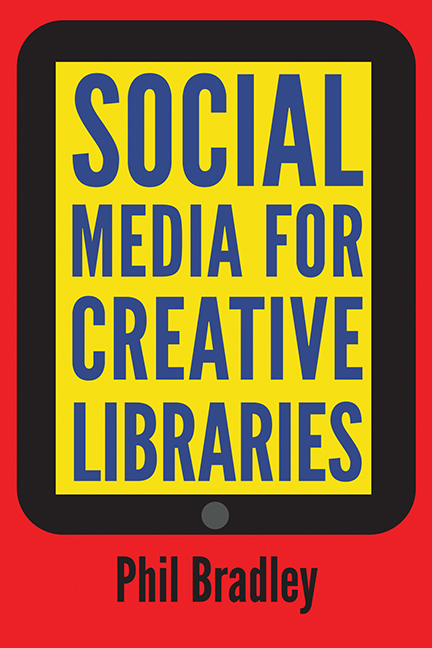Book contents
- Frontmatter
- Contents
- List of figures
- Preface
- 1 An introduction to social media
- 2 Authority checking
- 3 Guiding tools
- 4 Current awareness and selective dissemination of information resources
- 5 Presentation tools
- 6 Teaching and training
- 7 Communication
- 8 Marketing and promotion – the groundwork
- 9 Marketing and promotion – the practicalities
- 10 Creating a social media policy
- Appendix: Social media disasters
- Index
- Frontmatter
- Contents
- List of figures
- Preface
- 1 An introduction to social media
- 2 Authority checking
- 3 Guiding tools
- 4 Current awareness and selective dissemination of information resources
- 5 Presentation tools
- 6 Teaching and training
- 7 Communication
- 8 Marketing and promotion – the groundwork
- 9 Marketing and promotion – the practicalities
- 10 Creating a social media policy
- Appendix: Social media disasters
- Index
Summary
I first discovered social media by accident in about 2005. Of course, I’d been blogging for a few years by then, and found blogs a really useful way to keep up to date with what was happening in the areas that interested me. However, I started to notice a sudden influx of new tools that internet users could use to add content to their existing websites, to produce their own guides and so on. I also heard rumblings of a resource called Facebook, and shortly afterwards, some bizarre thing called Twitter. As I thought that some of these tools might be of interest to the information community I started to collect them and created a list on my website of about 100. I blogged once to tell readers that I had done this and within a week I was getting 50,000 hits a day on my website, and it was at about then that I realized there was a really large seismic shift in the way that the internet was evolving. Of course in those days we knew it as Web 2.0, and indeed in 2007 I wrote a title for Facet called How to Use Web 2.0 in Your Library.
Thankfully we quickly dropped the ‘Web 2.0’ terminology and moved on. Social media has developed since those early days and it has indeed changed the internet that we know, but it's also had a huge effect on the way that the world in general works and communicates. People are realizing that they have more power than ever before to create their own content, to share material with other people, to hold companies to account or indeed perhaps change the political structures of the country that they live in. Social media tools change the way that we get our news, and indeed, we can now become citizen journalists ourselves, but with that power also comes the responsibility of using it correctly. Some people have found to their cost and liberty that they’re not as free to say what they want as they perhaps thought they were.
However, ‘social media’ as a term is not something I find particularly helpful, since it comes with a great deal of baggage, much of it heaped on by the mainstream media. As you’ll discover as you read this book, I have tried to look at social media in a rather different way.
- Type
- Chapter
- Information
- Social Media for Creative Libraries , pp. xi - xviPublisher: FacetPrint publication year: 2015



